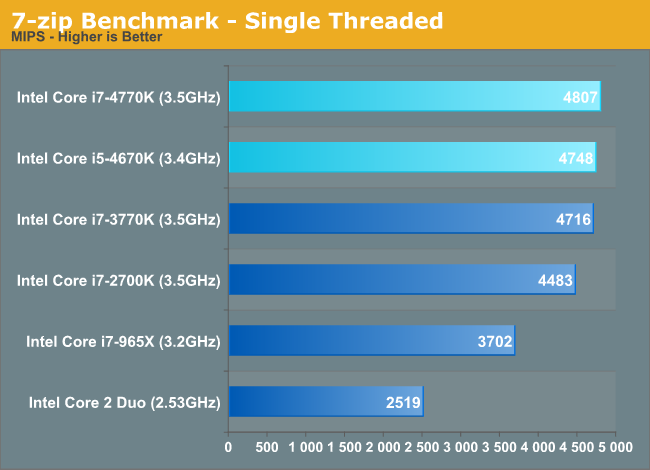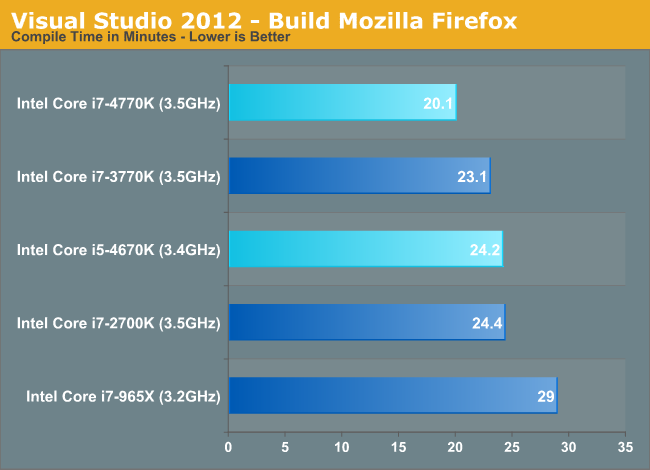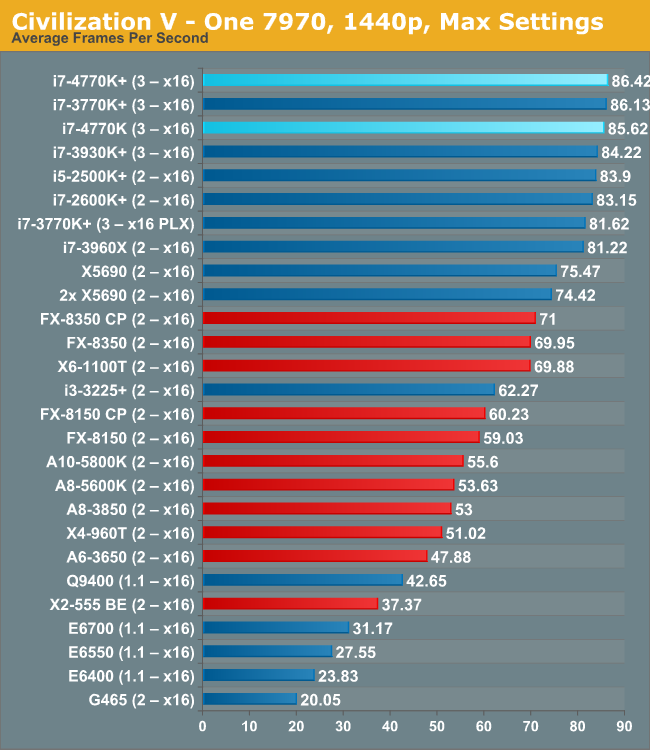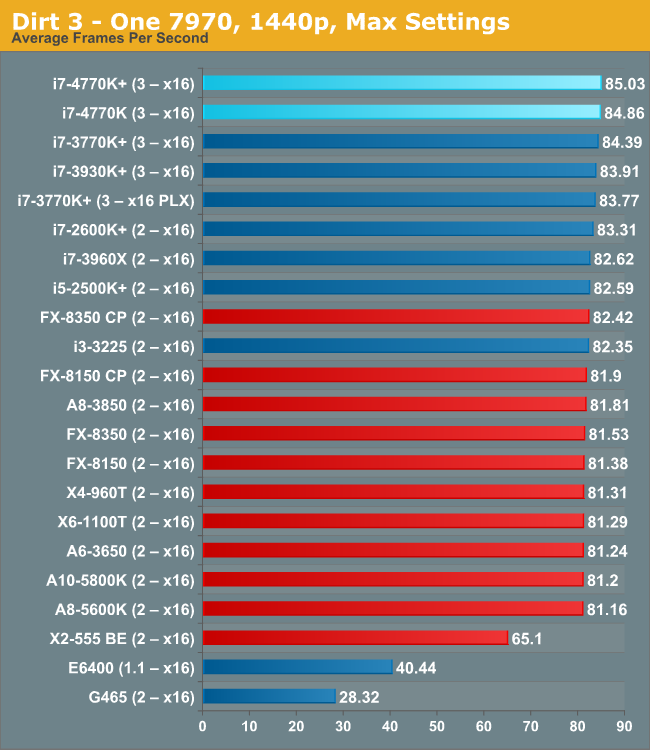The Haswell Review: Intel Core i7-4770K & i5-4670K Tested
by Anand Lal Shimpi on June 1, 2013 10:00 AM ESTCPU Performance: Five Generations of Intel CPUs Compared
For the purposes of our look at Haswell, we will be breaking up our review coverage into two parts. The rest of this article will focus on the CPU side of Haswell, while coverage of the GPU - including Iris Pro and Crystalwell - has been spun off into another artice: Intel Iris Pro 5200 Graphics Review: Core i7-4950HQ Tested.
The majority of the market doesn’t upgrade annually, so I went back a total of five generations to characterize Haswell’s CPU performance. Everything from a 2.53GHz Core 2 Duo through Nehalem, Sandy Bridge, Ivy Bridge and Haswell are represented here. With the exception of the Core 2 platform, everything else is running at or near the peak launch frequency for the chip.
In general, I saw performance gains over Ivy Bridge of 1 - 19%, with an average improvement of 8.3%. Some of the performance gains were actually quite impressive. The 7.8% increase in Kraken shows there’s still room for improvement in lightly threaded performance, while the double digit FP performance gains in POV-Ray and x264 HD really play to Haswell’s strengths.
Compared to Sandy Bridge, Haswell looks even more impressive. The Core i7-4770K outperforms the i7-2700K by 7 - 26%, with an average performance advantage of 17%. The gains over Sandy Bridge aren’t large enough to make upgrading from a Sandy Bridge i7 to a Haswell i5 worthwhile though, as you still give up a lot if you go from 8 to 4 threads on a quad-core part running heavily threaded workloads.
Compared to Nehalem the gains average almost 44%.











Quite possibly the most surprising was just how consistent (and large) the performance improvements were in our Visual Studio 2012 compile test. With a 15% increase in performance vs. Ivy Bridge at the same frequencies, what we’re looking at here is the perfect example of Haswell’s IPC increases manifesting in a real-world benchmark.
Gaming Performance
After spending far too much time on the Iris Pro test system, I didn’t have a ton of time left over to do a lot of gaming performance testing with Haswell. Luckily Ian had his gaming performance test data already in the engine, so I borrowed a couple of graphs.
As expected, Haswell is incrementally quicker in GPU bound gaming scenarios compared to Ivy Bridge - and most definitely at the top of the charts.












210 Comments
View All Comments
Iketh - Sunday, June 2, 2013 - link
Your post is so ignorant that you should have posting privileges revoked.gryer7421 - Monday, June 3, 2013 - link
? Everyone knew this was intels piledriver revision.Donkey2008 - Monday, June 3, 2013 - link
When you are "cynical" you will "see" nothing "good" in anything.jonjonjonj - Tuesday, June 4, 2013 - link
i agree. its annoying that intel is designing their desktop cpu's to also compete with arm in mobile. why can't intel develop 2 different versions or architectures? is power efficiency the limiting factor and if TDP and power was no concern how much better could intel do?i personally don't care about power on my desktop as long as the performance justifies it. desktop cpu's should be about performance not saving power.
Death666Angel - Tuesday, June 4, 2013 - link
How can you be disappointed when Haswell gives you exactly what was promised? It seems like you should have adjusted your expectations. Or you just like to be disappointed.I'm not surprised by these numbers, they are what was expected. I'm still running an i7-860 @3.8GHz and when I get enough money I'll upgrade to an i7-4770k and hopefully be able to run it at 4.5GHz, give or take some (water cooling setup here). Maybe IVB-E if it tests well and money is not too tight.
Anand really needs a Lynnfield for comparisons, because the i7-9xx was geared towards people running the enthusiast platform, whereas all the other CPUs tested here are geared towards mainstream high end.
ninjaquick - Wednesday, June 5, 2013 - link
Haswell at 1.8 GHz is a completely different story to any of this... Mark my words: You will never see 3.4 GHz parts in tablets, ever.However, a 30% improvement in efficiency can be roughly translated to a 30% increase in performance per watt. That is massive in tablets.
Sure, it won't be a 3.4 GHz tablet part, but it will also be a bit quicker than a 1.6 GHz tablet part.
mkygod - Wednesday, September 18, 2013 - link
Of course they are comparing to older CPUs because the article made a point to say that it does not make a whole lot of sense to upgrade from Ivy Bridge. But still, 5-10% faster compared to Ivy bridge is pretty good i would say for the extra ~$10-20 dollar difference.boe - Monday, June 3, 2013 - link
Its just as good as ivy bridge - pretty much ivy bridge pretending to be something new.Dnann - Friday, June 14, 2013 - link
It seems that not as good as I was imagining. :Orudolphna - Saturday, June 1, 2013 - link
Honestly, the best part of the review was the comparisons to older chips. It's entertaining to see just how terrible the Pentium 4 was in hindsight.